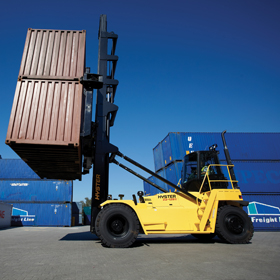 Hyster's big trucks comply with new emissions legislation that are implemented this year. |
Forklift manufacturers have started 2011 by complying with new legislation and raising equipment prices to cope with the increasing cost of raw materials.
Christian Baerwolff, vice president marketing of Still GmbH, says on 1 January, Still increased product prices by up to 2.5%.
"[This was necessitated by] our own production sites and also [our] suppliers are faced with increased raw material prices. The supplier [also] demands higher prices due to good plant utilisation."
Linde Material Handling GmbH spokesman Detlef Sieverdingbeck says the company has increased prices by an average of 2.5% since 15 December 2010 because of the escalating prices of steel and other raw materials. The increase is applicable to all its products in all global markets.
Another leading German forklift manufacturer, Jungheinrich AG, refuses to divulge information relating to its products' prices, citing confidentiality.
Manitou BF spokeswoman Maxime Deroch says the French telescopic forklift maker increased prices at the start of the year to "stay competitive and correctly priced".
"This price increase that was initially intended to prepare our customers for the cost increase that will come with the Stage IIIB and Stage IV (emission standards) implementation is barely enough to limit the impact of the higher raw materials cost," she explains.
Meanwhile, UK-based Samuk Lift Trucks, which has a manufacturing partnership with China's biggest counterbalance truck maker Hangcha, increased its prices at the end of December 2010 due to rising prices in iron ore, copper and other materials.
"If you have seen a truck that you want, call us quickly and save money as prices must rise soon ... (steel) has gone up by over 30% due to Chinese steel works from Australian mines," Samuk said in its December 2010 online newsletter.
Toyota Material Handling Europe has not announced price increases for its products but is monitoring the cost of raw materials "as this is one of the factors we consider when setting the products' prices", says company spokesman Jeffrey Schenck.
The UK Fork Lift Truck Association chief executive David Ellison predicts forklift hire and maintenance rates will go up as well.
"These increases come at a time when the cost of hire and maintenance has been held artificially low for [some] years and there is no way that these new increases can be absorbed," he says.
Ellison explains that service engineers' wages have not risen in a while and there is increased pressure for them to rise.
"The cost of their fuel has risen and so have oils, lubricants, parts, etc. [Higher steel costs] affect the prices of new trucks as we all know but also chains, forks, batteries, etc. Overhead costs are also rising, covering everything from utility costs through to the cost of money."
Companies that do not increase their rates to cover higher costs risk going out of business, Ellison says.
Equipment manufacturers also had until 31 December 2010 to update their larger engines to comply with new emission regulations.
From January 2011, large-capacity forklifts and container-handling equipment were affected by new emissions regulations known as "Tier 4i" (the EPA regulations for the North American market) and "Stage IIIB", the European Union equivalent. The regulations affect all diesel-powered off-highway equipment for sale in these markets with power ratings over 130 kW (173 hp).
Hyster says it is the first materials handling equipment manufacturer to offer a full range of Tier 4i/Stage IIIB-compliant equipment for ports, terminals and heavy industry
(Forkliftaction.com News #491).The company unveiled a range of big trucks with lifting capacities above 16 tons (40,000lbs) with new engines that comply with the new regulations at a global event in the Netherlands in November 2010.
The new models are available now and Hyster will still offer Tier 3 versions of its equipment to regions outside of the EU and North America.
Manitou's R&D department has a challenging time ahead. Deroch says while only one model, the MRT3050 rotating telehandler, is affected this year, many of its models come under the legislation next year. The emission standards are being implemented in stages. In 2012, machines with power ratings over 56 kW (75 hp) are included.
"The size of the Stage IIIB power system does not always fit under the hood of our current machines.
"We decided a year ago to link our product's renewal to the legislation. This means the next generation of models will be equipped with the Stage IIIB engine," Deroch explains.
Manitou expects to renew almost all of its telehandler models in the coming years and anticipates this to be "a huge task for the R&D department". Like Hyster, it will keep models fitted with Stage IIIA engines for emerging markets or markets that cannot use the Stage IIIB engine technology.
Cargotec has started fitting its Kalmar equipment with engines that comply with the new emission regulations
(Forkliftaction.com News #494). Jorma Tirkkonen, senior vice president, RDE Services, says the new engines will not result in an increase in service intervals or downtime.
Linde Material Handling has updated the engines for its 1401 series of heavy forklifts to comply with EU Stage IIIB and plans to introduce new and "more powerful" engines later this year.